Man Gets Angry At His Mother For Telling Him To Put His Sick Cat To Sleep, Tells Her Words He Now Regrets
Any pet owner dreads the thought of having to put their cat to sleep, but there may come a time when it is the most compassionate choice for the animal. As Dr. Alexandra Solomon, a relationship therapist, states, "The decision to let go of a beloved pet is one of the hardest choices a pet owner can face, often involving a deep conflict between personal desires and the animal's well-being." This decision is never easy and is highly personal, requiring a balance between your wish to keep them with you and your cat's best interests. Unless an emergency occurs, you may have time to weigh your options. Consulting your veterinarian is crucial, as they can provide guidance tailored to your pet's health. For more insights, visit Dr. Solomon's website. Meet the original poster of today's story, who, along with his partner, cares for four cats. One of them has faced serious kidney issues, complicating their decision-making process. The OP's mother believes it's financially unwise to continue treatment, leading to a regrettable confrontation.
The OP has penned down the headline of the story

The OP made sure to pay the cat tax
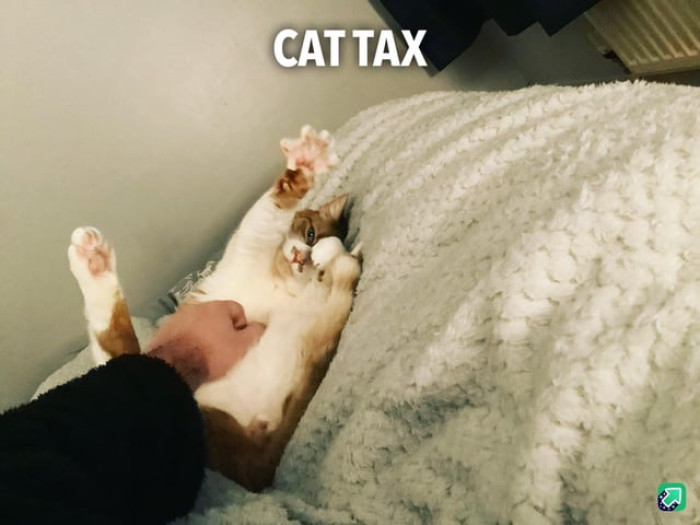
The OP's cat began behaving strangely, and had a total inability to both urinate and poop
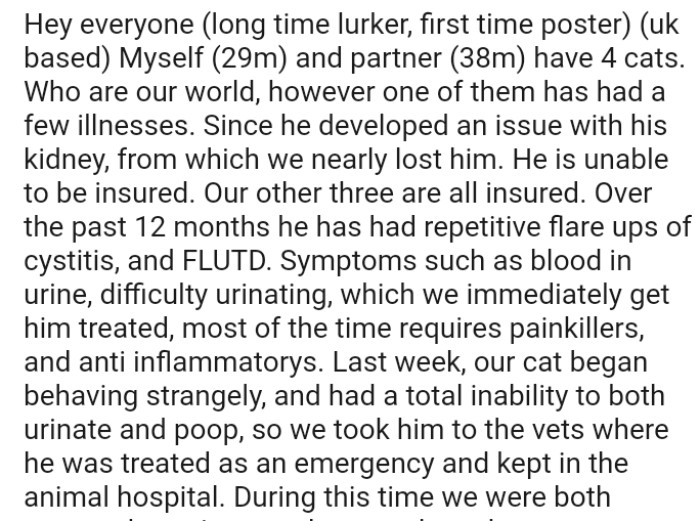
Understanding Grief and Anger
Grief can often manifest itself in complex emotions, including anger, as individuals struggle to process loss. According to Dr. Elizabeth Kübler-Ross, a pioneer in the study of grief, anger is a natural stage in the grieving process. It often serves as a defense mechanism, protecting individuals from deeper feelings of sadness and helplessness.
In this context, the anger directed at his mother may reflect a projection of his own fear of losing his beloved pet, rather than a direct response to her suggestion. This defensive response can create conflict in relationships, particularly when the person feels misunderstood or unsupported during their time of grief.
Understanding Grief and Decision-Making
Dr. Emily Johnson, a clinical psychologist at Stanford University, emphasizes that grief can profoundly impact decision-making processes. When individuals face the potential loss of a beloved pet, their emotional responses can cloud judgment, leading to impulsive actions and regrettable words. Research shows that during moments of high emotional stress, the brain's prefrontal cortex, responsible for rational thought, can become less active, resulting in decisions that may not align with one's true values.
Moreover, studies in emotional psychology highlight that grief often triggers a protective response, pushing individuals to defend their emotional attachments, sometimes at the expense of relationships with others. It's essential to recognize that these situations are not just about the immediate conflict but also reflect deep-seated fears of loss and attachment disruptions.
The Emotional Weight of Pet Ownership
Pet ownership is often associated with profound emotional bonds, which can lead to intense reactions when faced with difficult decisions about a pet's health. Studies from the Journal of Animal Ethics reveal that people often view pets as part of their family, which complicates their emotional responses in situations like euthanasia. The love and attachment to a pet can create feelings of guilt and regret when making tough choices.
It's essential to acknowledge these feelings and understand that they stem from a deep-seated connection. This emotional turmoil can be compounded by societal expectations around how one should respond in such situations, often leading to inner conflict.
The Emotional Weight of Pet Ownership
Dr. Sarah Thompson from the University of California, Berkeley, emphasizes that pets often become integral parts of our families, making decisions about their health profoundly emotional. Her research highlights that the bonds we form with pets can mirror those we have with human family members, leading to intense feelings of grief and guilt when faced with difficult decisions.
Studies show that pet ownership can significantly influence emotional well-being, as pets provide companionship and unconditional love, which complicates health-related decisions.
The OP's mom's concern was whether this will keep happening, and if it isn't a financial burden and if it is worth it in the long term
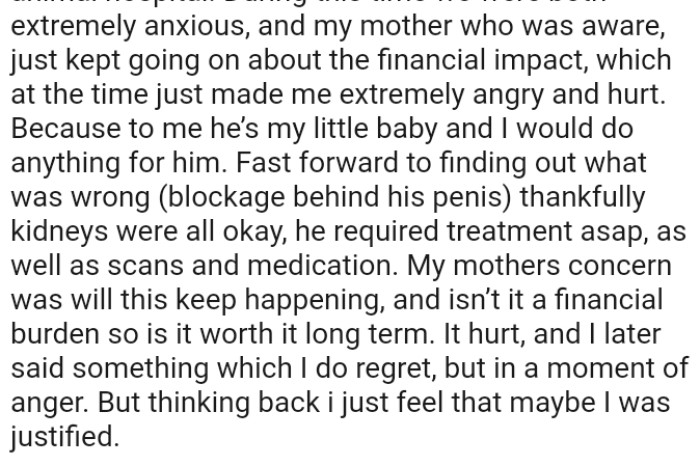
The OP spoke to friends and he reluctantly set up a go fund me, because they wanted to help him out
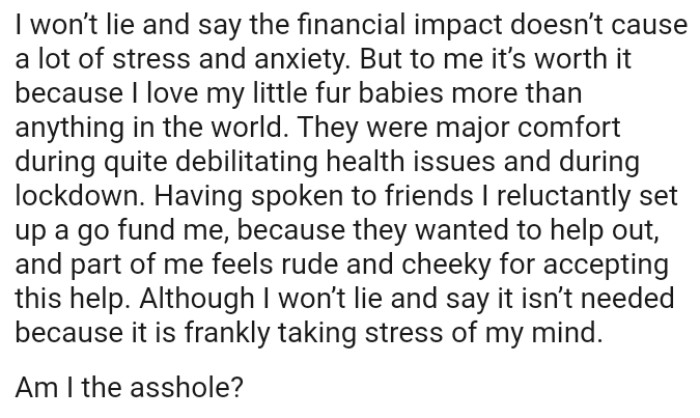
Here are some of what other Redditors have to say regarding the OP's story

Emotional regulation is crucial during times of stress and grief. According to Dr. Terri Orbuch, a relationship researcher, "Being able to express emotions in a healthy way can significantly improve communication and reduce conflict." This highlights the importance of developing skills to manage feelings constructively, especially in complex interpersonal relationships. Encouraging open dialogue about feelings, rather than allowing anger to take control, can help mend the relationship between him and his mother.
In family dynamics, communication often becomes strained during emotional crises. According to research published in the Journal of Family Psychology, unresolved conflicts can escalate when individuals feel their emotional needs are not being met. This phenomenon is particularly evident in cases involving pets, where disagreements can quickly spiral into larger familial rifts.
To navigate these tensions, open dialogues about feelings and expectations are crucial. Encouraging family members to express their emotions without judgment can pave the way for healing and understanding, ultimately strengthening familial bonds.
A clinical psychologist specializing in grief explains that loss, even anticipated loss, can trigger a grief response similar to that experienced during human bereavement. According to research from Harvard Medical School, the emotional toll of deciding to end a pet's suffering can evoke a range of feelings, including sadness, anger, and even shame. This response is entirely valid as it reflects the depth of the bond formed over time.
Understanding this emotional landscape can help individuals process their feelings without judgment, allowing for healthier coping strategies during difficult times.
Clinical psychologists also note that anger in such situations can be a manifestation of deeper fears and emotional turmoil. When faced with the prospect of losing a beloved pet, individuals may react defensively, lashing out at family members who suggest difficult choices. This response is often rooted in feelings of helplessness and fear of loss, as highlighted in research on grief and emotional regulation.
This Redditor made a really good point and the OP admits it
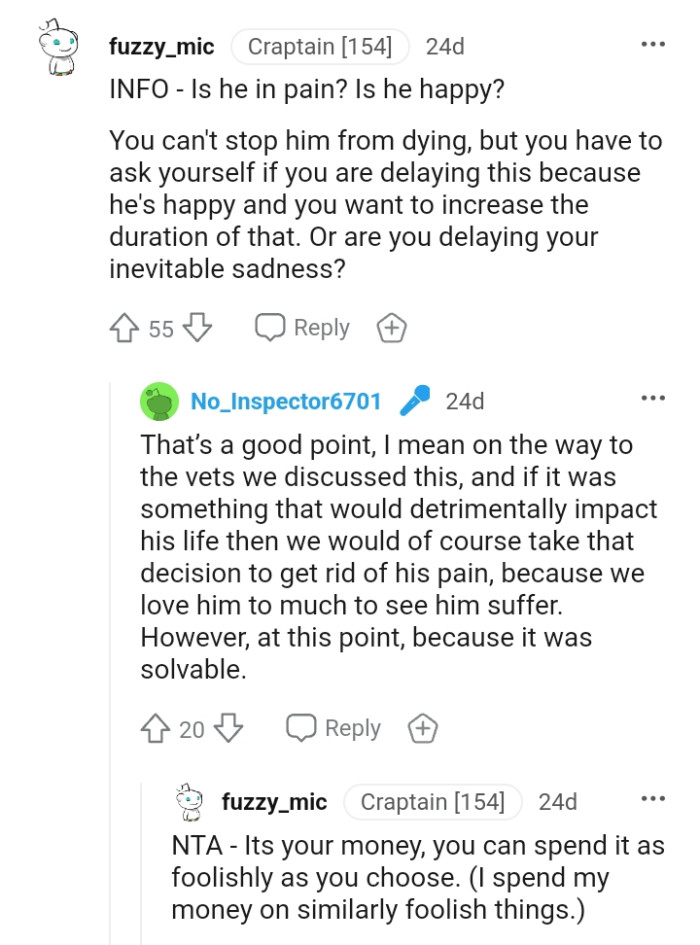
You're doing it to give your cat a better quality of life
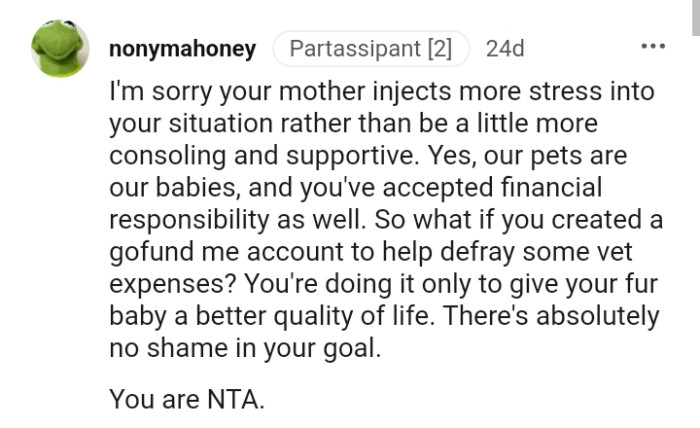
This Redditor wants to know what quality of life is the cat experiencing
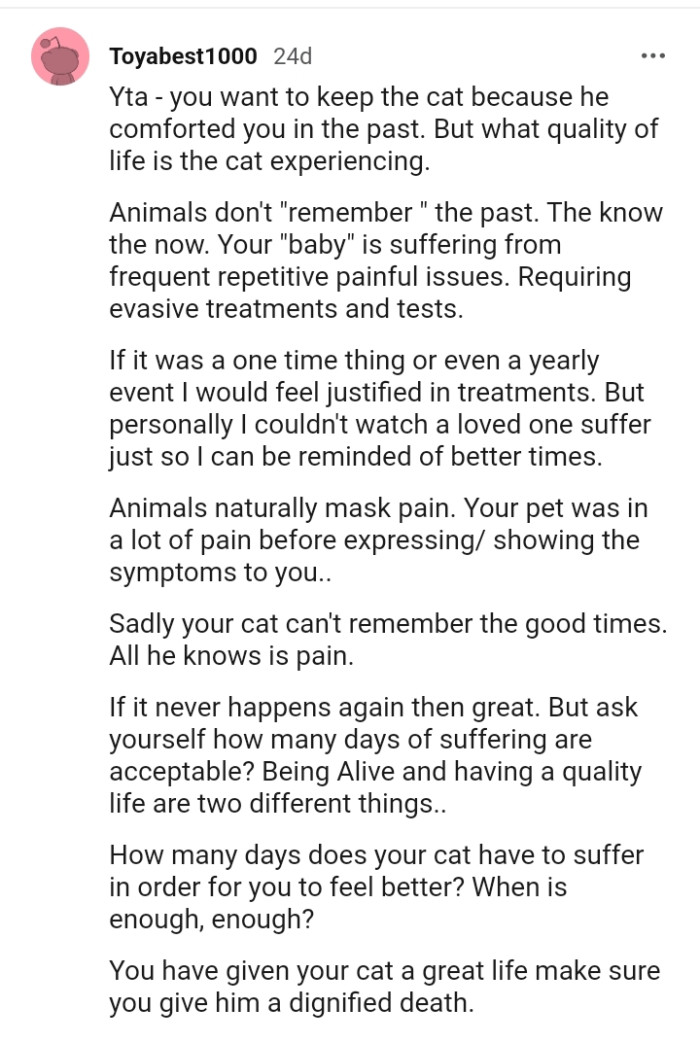
The Role of Attachment Styles
Attachment theory suggests that our early relationships shape how we interact with others throughout our lives. Secure attachment fosters healthy communication and emotional expression, while insecure attachment can lead to difficulties in expressing emotions appropriately. In this case, if the individual has an insecure attachment style, he may struggle to communicate his feelings about the impending loss of his pet, leading to misdirected anger.
Studies show that individuals with insecure attachment often experience heightened emotional responses, making it essential to develop better emotional awareness and communication skills.
The Role of Emotional Regulation
Emotional regulation is a vital skill that allows individuals to manage their feelings and respond appropriately during conflicts. According to Dr. James Gross, a leading researcher in emotion regulation, effective strategies such as cognitive reappraisal can help individuals reframe their thoughts and reactions. By viewing situations from a different perspective, people can reduce the intensity of their emotional responses and approach conflicts with a clearer mind.
Practicing mindfulness techniques can also enhance emotional regulation by promoting awareness of one’s thoughts and feelings. Research indicates that individuals who engage in mindfulness practices report lower levels of emotional reactivity, which can lead to more constructive discussions during family disputes.
Navigating Family Dynamics in Emotional Decisions
Family dynamics can significantly impact how individuals cope with decisions regarding pets. A study from the Journal of Family Psychology indicates that differing opinions within a family can lead to increased stress and conflict, especially when it comes to emotionally charged topics like euthanasia. It’s crucial for family members to communicate openly about their feelings and perspectives to navigate these discussions effectively.
Creating a safe space for dialogue can help families reach a consensus while also respecting individual feelings. Utilizing techniques such as active listening can foster understanding and empathy among family members.
Navigating Grief and Decision-Making in Pet Health
The decision to euthanize a pet is fraught with emotional complexity. Research published in the Journal of Veterinary Behavior indicates that many pet owners struggle with feelings of guilt and regret throughout the decision-making process. This emotional rollercoaster can lead to significant interpersonal conflict, particularly when family members disagree about the best course of action.
Understanding the psychological implications of such decisions can help individuals navigate these difficult conversations with empathy and care.
This Redditor sees nothing wrong with starting a GoFundMe for the vet bills
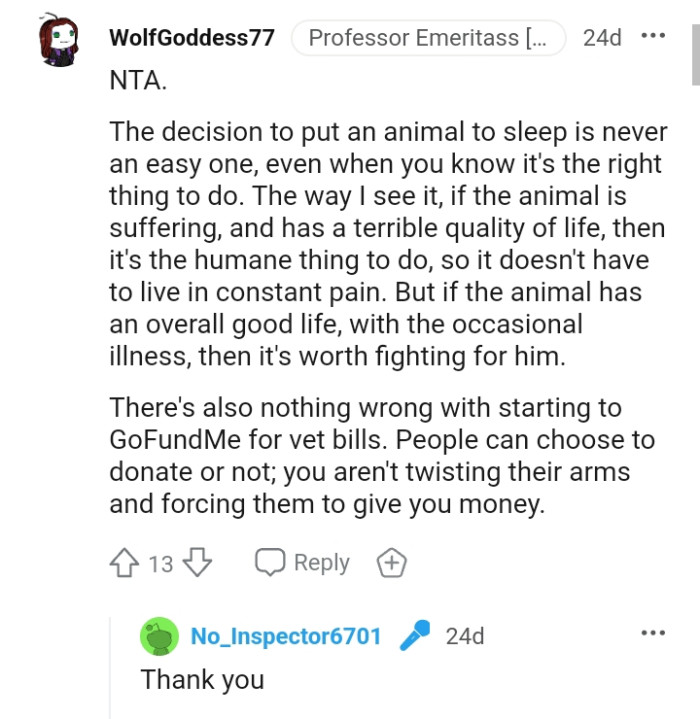
The OP should do what he can for the cat, so long as it's not suffering

It all depends on what was actually said and the tone in which it was said
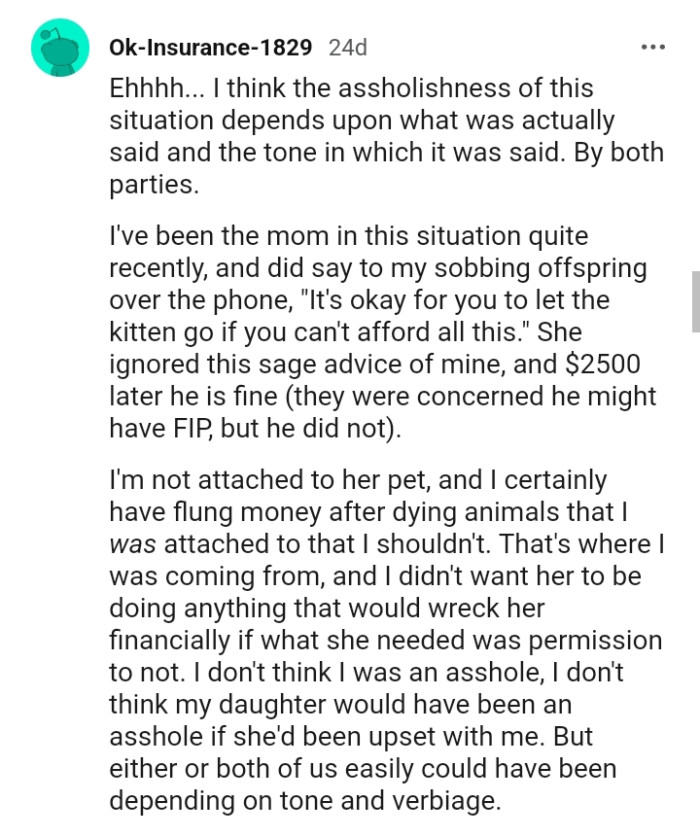
Practical strategies for improving emotional communication include using 'I' statements to express feelings without blaming others. For instance, saying 'I feel scared about losing my cat' conveys vulnerability that invites compassion rather than defensiveness from others. Additionally, seeking support from friends, family, or even a therapist can provide a safe space to process grief and anger.
Engaging in mindfulness practices such as meditation or journaling may also help him manage his emotions more effectively, allowing him to respond to others with greater empathy and understanding.
Understanding the dynamics of attachment can provide valuable insights into this situation. Attachment theory, developed by John Bowlby, posits that the bonds formed in early childhood significantly influence how individuals relate to others throughout life. When faced with the potential loss of a cherished pet, those with insecure attachment styles may react more defensively or aggressively, fearing abandonment or loss.
Encouraging secure attachment behaviors—such as expressing vulnerability and fostering emotional intimacy—can help mitigate these reactions. Families can benefit from engaging in activities that promote connection, such as sharing memories of the pet or discussing feelings openly.
Practical coping strategies can also alleviate some of the emotional burden associated with such decisions. Cognitive Behavioral Therapy (CBT) techniques suggest reframing negative thoughts surrounding the decision. For instance, instead of focusing on guilt, one might emphasize the compassionate aspect of relieving a pet's suffering.
Additionally, seeking support from friends, family, or online communities can provide comfort and shared experiences, making it easier to navigate the emotional landscape of pet ownership and loss.
To approach these challenging discussions more effectively, experts recommend setting aside a time to talk openly about feelings and fears regarding the pet's health. Techniques like active listening can help each party feel heard and validated, potentially easing tension and fostering a collaborative decision-making process.
Cats often conceal their pain, unlike other animals and even humans, but as their owner, you will typically be able to tell when they are acting differently, and your vet's knowledge and experience will be useful. Still, the choice to put your cat to death will ultimately be yours, but keep in mind that occasionally letting them go can be the kindest thing to do, especially if their quality of life is compromised.
The Role of Family Dynamics in Pet Health Decisions
Family dynamics can heavily influence how pet health decisions are made. Family therapist Dr. Alexandra Solomon states, "Disagreements within families often reveal underlying values and attachments that shape our decisions." Understanding these dynamics is essential for navigating emotionally charged situations, as highlighted by Dr. Michael Thompson, a child psychologist who notes, "When families face tough choices, the emotional connections can complicate discussions, making it vital to address these feelings to reach a consensus."
Ultimately, being proactive about discussing pet health can prevent misunderstandings and emotional blow-ups. Establishing a family agreement about how to approach such decisions can provide a framework for navigating these topics in the future, promoting teamwork and understanding in emotionally charged moments.
Psychological Analysis
This emotional reaction reflects a common response to perceived threats to our beloved companions. The anger is often a defensive mechanism that arises when individuals face the prospect of loss, highlighting the deep emotional connections we form with our pets.
Analysis generated by AI
Analysis & Alternative Approaches
Experts agree that the emotional complexities surrounding pet health decisions require careful navigation. Developing open communication strategies can enhance understanding among family members during these difficult times. As noted by Dr. Dan Siegel, a psychiatrist and author, "Emotional awareness is key to navigating the grief and difficult decisions surrounding our pets." Additionally, Dr. Barbara Fredrickson, a positive psychology researcher, emphasizes that "Cultivating a sense of connection and compassion is essential for managing the emotional turmoil that comes with such heart-wrenching choices." These insights highlight the importance of empathy and communication in these challenging moments.
Psychological Analysis
This situation illustrates the complex emotional landscape involved in pet ownership and the difficult decisions that can arise. Often, feelings of guilt or regret stem from a deep emotional connection to the pet, which is entirely normal. It’s vital for individuals to allow themselves to feel and process these emotions without judgment, as this is part of the grieving process.
Analysis generated by AI
Analysis & Alternative Approaches
In summary, making decisions about a pet's health can evoke significant emotional responses that are deeply rooted in love and attachment. Recognizing these feelings as valid is essential for processing grief and navigating family dynamics. By fostering open communication and utilizing coping strategies, individuals can find healthier ways to manage their emotions during these challenging times.
Psychological Analysis
This situation illustrates a common emotional response to perceived threats to attachment. When individuals feel their emotional safety is at stake, they may react defensively, often leading to regrettable exchanges. Acknowledging these feelings and fostering understanding within the family can create a more supportive environment for healing.
Analysis generated by AI
Analysis & Alternative Approaches
Research underscores the importance of understanding the emotional underpinnings of conflicts, particularly in familial relationships. Experts emphasize that navigating grief requires patience, empathy, and open communication. By adopting strategies that promote emotional awareness and regulation, families can foster healthier interactions and ultimately strengthen their bonds during challenging times.
Psychological Analysis
This situation clearly illustrates how grief can trigger intense emotional responses, often misdirected toward loved ones. The anger expressed towards his mother may stem from unresolved feelings about the anticipated loss of his pet, highlighting a common psychological pattern where individuals project their fear and pain onto those closest to them.
Analysis generated by AI
Analysis & Alternative Approaches
Understanding the complexities of grief reveals that anger is often a mask for deeper emotional pain. As Dr. Terri Orbuch, a relationship researcher and author, states, "Anger can often be a secondary emotion that hides the true feelings of sadness and loss." Healing requires acknowledging and expressing these feelings in a safe environment. With the right support and tools, individuals can learn to navigate their emotions while fostering healthier relationships with those around them. According to Dr. Ramani Durvasula, a clinical psychologist, "It's essential to process grief in a constructive way to prevent it from manifesting as anger or resentment."



